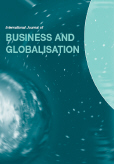Forthcoming Articles
International Journal of Business and Globalisation

Forthcoming articles have been peer-reviewed and accepted for publication but are pending final changes, are not yet published and may not appear here in their final order of publication until they are assigned to issues. Therefore, the content conforms to our standards but the presentation (e.g. typesetting and proof-reading) is not necessarily up to the Inderscience standard. Additionally, titles, authors, abstracts and keywords may change before publication. Articles will not be published until the final proofs are validated by their authors.
Forthcoming articles must be purchased for the purposes of research, teaching and private study only. These articles can be cited using the expression "in press". For example: Smith, J. (in press). Article Title. Journal Title.
 Articles marked with this shopping trolley icon are available for purchase - click on the icon to send an email request to purchase.
Articles marked with this shopping trolley icon are available for purchase - click on the icon to send an email request to purchase.
Online First articles are also listed here. Online First articles are fully citeable, complete with a DOI. They can be cited, read, and downloaded. Online First articles are published as Open Access (OA) articles to make the latest research available as early as possible.
Register for our alerting service, which notifies you by email when new issues are published online.
International Journal of Business and Globalisation (One paper in press) Regular Issues
Abstract: ntegrating artificial intelligence (AI) in sustainable higher education practices prove to be beneficial in the teaching and learning process of institutions. With the many probable practices which promote sustainability in higher education, stakeholders must be able to proactively prioritise practices given the lack of resources for the full-blown implementation of sustainable higher education practices. Along this line, this paper employs interpretive structural modelling (ISM) with MICMAC analysis to generate a framework for stakeholders to use in prioritising such practices. A real-life case study in a state university in the Philippines is conducted to understand how AI is integrated in sustainable higher education. Interestingly, the framework points out data collection monitoring systems as the core practice to be tackled by educational institutions. Keywords: artificial intelligence; sustainable higher education; interpretive structural modelling; ISM; MICMAC analysis; state university. DOI: 10.1504/IJBG.2025.10074950 |
 Open Access
Open Access